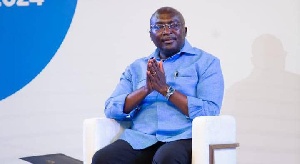- Home - News
- Elections 2024
- News Archive
- Crime & Punishment
- Politics
- Regional
- Editorial
- Health
- Ghanaians Abroad
- Tabloid
- Africa
- Religion
- Photo Archives
- Press Release
General News of Tuesday, 20 May 2025
Source: www.ghanawebbers.com
'$5bn in gold or $3bn in loans; we chose sovereignty' - Bawumia defends gold strategy
Former Vice President Dr. Mahamudu Bawumia defended his government's decision to buy gold. He spoke during his Thank You Tour of the UK with the Young Executive Forum (YEF). He called this choice a matter of economic sovereignty versus dependency.
Dr. Bawumia stated, “$5 billion in gold or $3 billion in loans – we chose sovereignty.” He argued that the Bank of Ghana’s gold purchase program strengthened the cedi.
“In two years, the Bank of Ghana bought $5 billion worth of gold,” he noted. He compared this to seeking $3 billion from the IMF, which involved many challenges.
He highlighted impressive results from this strategy. “We increased Ghana's gold reserves from 8.7 tons to 30 tons,” he said. After 65 years of independence, only 8.7 tons existed, but they reached 30 tons in just two years.
Dr. Bawumia explained why buying gold was logical. “You don’t need to export to get gold,” he said. In contrast, cocoa and timber require exports for foreign exchange.
He dismissed any credit to the opposition for the cedi's recent appreciation. “If you ask the NDC what policy led to this change, they cannot tell you one,” he claimed.
He pointed out that they only passed their budget in March and have not issued contracts yet. The foundation for the current cedi performance lies with decisions made under the NPP government.
“People are noticing our reserves after all the election noise,” he added. The NDC has not increased reserves by even one ton since taking office.
Dr. Bawumia identified three main factors affecting the cedi: Ghana’s gold-backed currency, global dollar weakness, and fiscal restraint by his administration.
“The US dollar is declining globally,” he explained using Zambia as an example where its currency gained value due to a weaker dollar.
He also criticized the current government's inaction on spending bills like those for Independent Power Producers (IPPs).
“This lack of spending contributes to acute dumsor,” he said about power shortages. When there is less spending, there is less pressure on currency stability.
Dr. Bawumia warned that maintaining macroeconomic stability depends on how future administrations manage existing resources.
“I believe what we established will help maintain currency stability long-term,” he concluded, but emphasized that management will be crucial moving forward.











